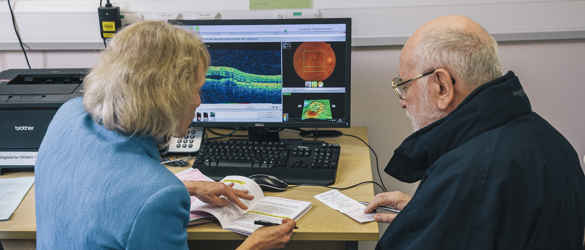Architecture graduate with Stargardt wants to make buildings more inclusive
Posted: Monday 02 December 2024
A recent architecture graduate who is losing her sight to Stargardt disease, says the experience has motivated her to design everyday spaces that are accessible to everyone.
Emily, 23, who recently graduated from UWE Bristol with a degree in Architecture and Planning, was diagnosed with Stargardt disease during her A levels.
She said: “Originally, I wanted to go into architecture because I really love drawing and I love the mathematical thinking around it. As I went through my course, it became more about actually making a difference to the world, creating more accessible spaces.”
Redesigning local spaces
As part of her final project Emily redesigned part of Bristol Harbourside.
She added: “Most people use sight as their primary sense so they see a building and go, 'Oh that looks really nice' whereas a lot of people experience the world through their other senses, not vision.
"I want to design more pleasant spaces to be in and just make everything slightly more inclusive for everyone and a slightly better place for the future.”
A genetic condition
Emily first became aware of Stargardt disease when her younger sister started losing her sight.
"My sister went blind a few years before me, about three years before I found out anything, but we didn't know what it was.”
It took two years of uncertainty before genetic tests confirmed the condition. Not long after, Emily began noticing changes in her own vision and soon had to give up her part time job as a waitress.
She said: “I was registered visually impaired. Then by the October, I was severely visually impaired, and I had to quit my part-time job in the November because I couldn't see to wait the tables properly."
Emily had to change the subjects she was studying, as her sight continued to get worse.
She said: “I ended up dropping chemistry and taking up graphics, which doesn't seem a very logical subject to take. But it was easier than chemistry.
"And then I was doing my A-levels, and it got to the point where I couldn't draw on paper anymore."
Continuing to pursue her passions
For Christmas Emily got an Apple pencil which has enabled her to continue to pursue her love for art. But, as her vision changed so quickly at such an pivotal time in her life, she had little time to get her head around the change.
She said: “It basically meant that I didn't have time to process any of my sight loss at the time because I was so focused on actually carrying on with everything else."
But as Emily had already applied for university she didn’t let it hold her back.
She said: “I've grown up drawing, painting and everything. So, then it got to a point where I was doing art A levels and I'd always planned on going into an art based career. I then just carried on with that because that's what I enjoy.
“I’d already applied for university so I did the foundation year, and then it was the next year that I actually lost a lot more of my sight. And it was around then that I started to actually process it and work out more methods to help. It took a few years.”
'I tell people I am blind'
Talking about how she explains her condition to others, Emily said: “If I’m talking about my eyesight I say that I am blind, as it is easier to get my point across quickly. It’s much easier to explain than saying I have a rare form of juvenile macular degeneration, meaning that I have no central vision.”
If you’ve been diagnosed with macular disease the Macular Society is here to help.
Contact the Helpline on 0300 3030 111 or email help@macularsociety.org
The benefits of registering as sight impaired
If you have a permanent visual impairment, you may be eligible to be registered as sight impaired.
Support for you
We provide free information and support to those with macular disease, along with their family and friends, to help people keep their independence.




